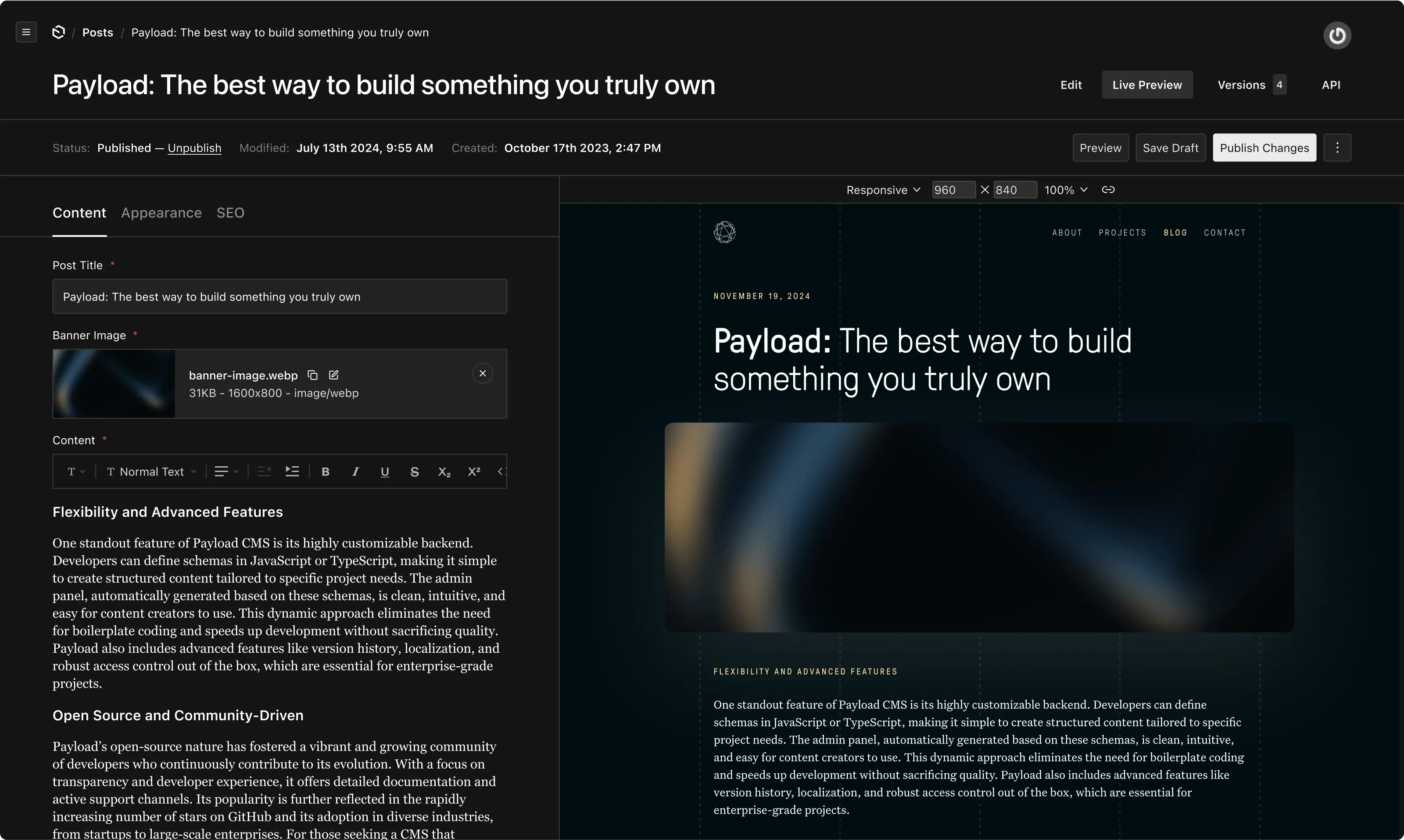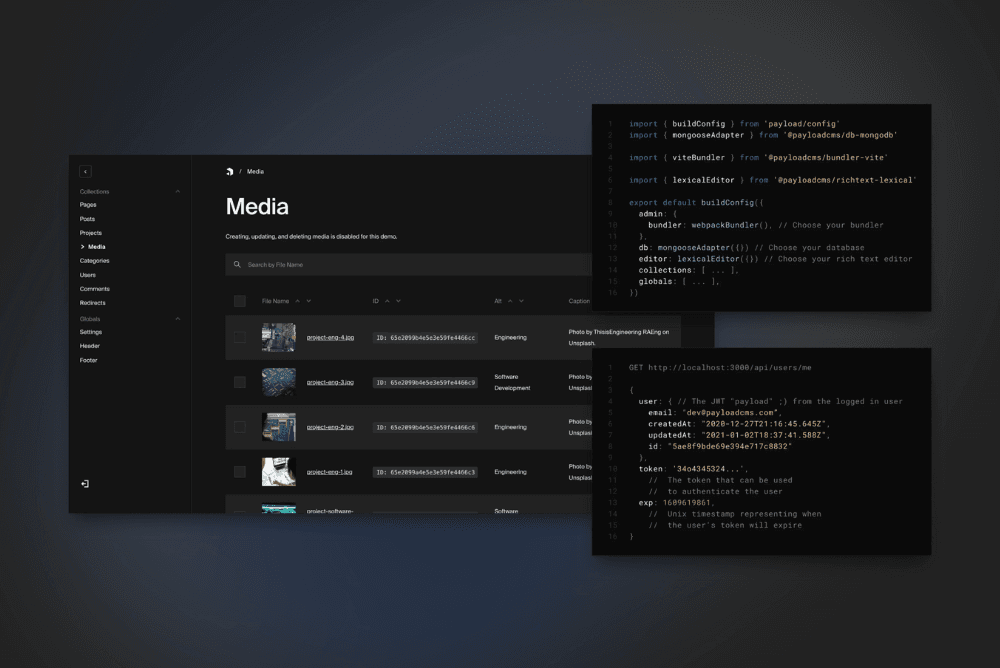Why we switched to a ready-made CMS – and why you should consider it, too
27 Mar 2025
For years, we built and maintained our own custom CMS at Autentika. It was tailored to our clients’ unique needs and reflected our ambition to create software that could adapt to the most complex requirements. But over time, our perspective evolved. Today, we want to share why we believe that a ready-made CMS – specifically Payload – is a smarter choice than going with a custom solution developed and maintained by a single company. And why it’s a move your business should consider, too.
Our journey started on the custom side of the CMS spectrum. We decided to build our custom solution as back then, the options available – like WordPress or Joomla – just didn’t meet the standards we were aiming for. So we built our own CMS, named Hitso, and used it as the foundation for nearly every client project.
But developing and maintaining our own platform came with a cost – each new version of Hitso required major rewrites. Backward compatibility wasn’t feasible, and our clients couldn’t upgrade without significant effort. That made long-term support, security, and performance much harder to guarantee. Over time, this created fragmentation: each client was on a slightly different version, and maintaining those environments became more complex and expensive.
Also, the technology itself moved on, and a new generation of CMS platforms matured rapidly. JavaScript took center stage. Headless CMSs became the norm. Open-source platforms matured at lightning speed.
And suddenly, our once-innovative platform started to feel… outdated.
As a small company with limited resources, we had always built software around specific client needs. That made it hard to reuse code or scale features across projects. We also began running into the classic pitfalls of custom-built systems: knowledge silos that made onboarding new developers harder, outdated technologies that couldn’t keep up with the market, and a growing inconsistency between different client implementations. Maintaining our platform became increasingly costly and complex.
Eventually, we started losing tenders—because of the technology we were offering.
That was the wake-up call we needed.
Choosing Payload
We knew that moving away from our custom CMS would be a big shift, so we took the decision seriously. We spent months researching modern CMS platforms. We compared features, community support, extensibility, and tech stacks. Our shortlist came down to Strapi, Sanity, and Payload.
In the end, Payload stood out. It matched our preferred stack, aligned with how we wanted to build products, and had the kind of modern developer experience that excited our team.
Now, nearly two years later, we’re confident it was the right choice.

Here’s what changed after we made the switch:
Happier devs. Our team works with a modern tech stack they actually enjoy. This has become a huge asset in recruitment.
Faster sales. Clients are more confident when we present a well-known, open-source platform instead of a homegrown system.
Stronger credibility. Payload is actively developed, backed by a growing community, and used by brands around the world.
Better features, out of the box. SSO, visual editors, publishing workflows, API-first architecture, A/B testing, version control—you name it. Building all this ourselves just wasn’t realistic.
Community-driven development. With Payload, we benefit from constant improvements, security updates, and best practices shared across a global user base.
Looking back, we only regret not making the switch sooner.
What this means for our clients
Our journey has fundamentally changed how we think – and talk – about CMS platforms. Today, we’re strong advocates of open-source solutions. And we speak from experience: we’ve been on both sides.
We understand the benefits of custom-built platforms but they’re significantly outweighed by the flexibility, support, and future-readiness of open-source systems. Platforms like Payload come with a solid reputation and a modern tech stack. They’re used by thousands of trusted brands and supported by active, engaged communities. Updates, tutorials, plugins, integrations, help when you need it—it’s all part of the package.
Security? It’s constantly monitored and improved by the community. Enterprise features? They’re built in—SSO, complex publishing workflows, rich API support, visual editing tools for content teams, A/B testing, logging, version control, and more.
These are things we simply couldn’t deliver at scale with a custom-built solution.
The business case for Payload CMS
Beyond the technical advantages, choosing an open-source platform like Payload brings clear business benefits that go well beyond development efficiency.
Financial benefits
Lower Total Cost of Ownership (TCO). There are no licensing fees—initial costs are limited to implementation and customisation.
Predictable development costs. Clear documentation and a strong community make it easier to estimate effort and pricing for new features.
Savings on testing. Core functionalities have already been validated by a broad user base.
Independence & business continuity
Vendor independence. Open-source solutions aren’t tied to a single development company.
Business continuity. Even if one vendor stops supporting the platform, others can step in.
Transparency. Open source code can be audited at any time, increasing trust and improving security compliance.
Quality & innovation
Proven technology. Payload is actively tested and improved by a wide developer community.
Faster feature growth. New capabilities are added regularly thanks to community contributions.
Greater flexibility. It’s built to support a variety of use cases—not just one client’s requirements.
Operational efficiency
Faster time to market. Using pre-built components speeds up project delivery.
Easier talent acquisition. More developers are familiar with popular open-source tools than proprietary platforms.
Community support. Many common problems already have solutions available in forums or documentation.
Scalability & long-term growth
Future-ready. Open-source platforms tend to adapt faster to evolving tech trends.
Modular architecture. Easier to integrate with modern technologies and third-party systems.
Standards-compliant. Aligns with industry best practices for scalability, security, and maintainability.
We’re not looking back
By switching to Payload, we’ve gained more than just a new CMS—we’ve unlocked faster growth, better tooling, and a more sustainable future for both us and our clients. Open-source platforms like Payload offer the security, scalability, and flexibility modern digital projects demand. They allow us to focus on what truly matters: delivering exceptional user experiences.
If we could go back, we’d make the switch sooner. But now that we’re here, we’re all in.



